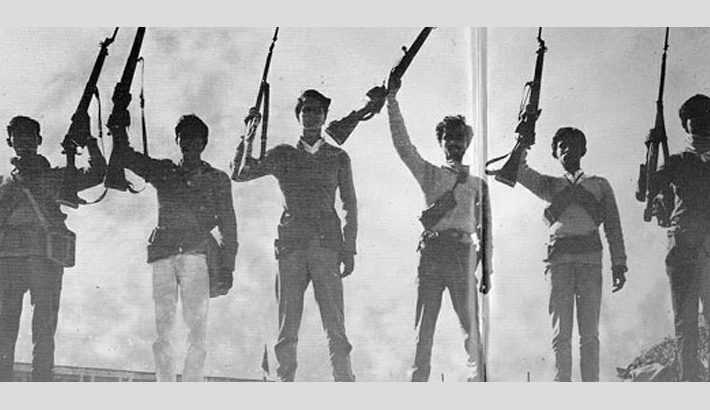War of Liberation, The began on 26 March 1971 and ended with the liberation of Bangladesh on 16 December 1971. The armed struggle was the culmination of a series of events, situations and issues contributing to the progressively deteriorating relations
between East and West Pakistan. The questions of land reforms, state language, inter-wing economic and administrative disparities, provincial autonomy, the defense of East Pakistan and many other consequential questions
had been straining the relations between the two wings of Pakistan ever since independence of the country from Britain in 1947.
The general elections of 1970 had made Bangabandhu sheikh mujibur rahman, chief of awami league which bagged 167 seats out of 169, the sole spokesman of the people of East Pakistan and majority leader
in the Pakistan National Assembly. But the Pakistan civil and military ruling clique had refused to transfer power to the majority leader Sheikh Mujibur Rahman and his party. Sheikh Mujib also refused to yield to
the pressure put on him for undue accommodation. Sheikh Mujib's historic address on 7 March 1971 made this point quite clear to the Pakistani military junta. Then began the civil disobedience movement. Meanwhile
talks started between Sheikh Mujib and President Yahya Khan to resolve the outstanding issues.
While holding talks, the Pakistani military junta was bringing more troops to Bangladesh, and at the same time wantonly killing innocent civilians all over the country. This clearly showed that they were
totally insincere about handing over power to the elected representatives of East Pakistan. No sooner the talks failed, the genocide began with the Pakistan army's crackdown on the people of East Pakistan on the
midnight of 25 March 1971. The Bangali soldiers serving in the then Pakistan Armed Forces and para militia forces declared instantly their solidarity with the people's liberation war.
Genocide, 1971 The Pakistan Army was ordered to launch operation on Bangali people at midnight of 25 March. According to the plan for operation Search Light two headquarters were established. Major General
Rao Farman Ali with 57 Brigade under Brigedier Arbab was responsible for operation in Dhaka city and its suburbs while Major General Khadim Raja was given the responsibility of the rest of the province. Lieutenant
General Tikka Khan assumed the overall charge of the operation.
The students and the nationalist political activists put up resistance outside the cantonment. Road blocks were raised to obstruct the march of the Pakistani column to the city areas. The wireless set
fitted jeeps and trucks loaded with troops groaned on the streets of Dhaka City at midnight of 25 March.
The first column of the Pakistan army faced obstruction at Farmgate, about one kilometre from the cantonment, due to a huge road block created by placing big tree trunks across the road. The hulks of old
cars and unserviceable steam roller were also used in creating the blockade. Several hundred people chanted the slogan Joi Bangla which lasted for about 15 minutes. But soon guns silenced them. The army moved into
the city before scheduled time and started the genocide.

Leave your comment